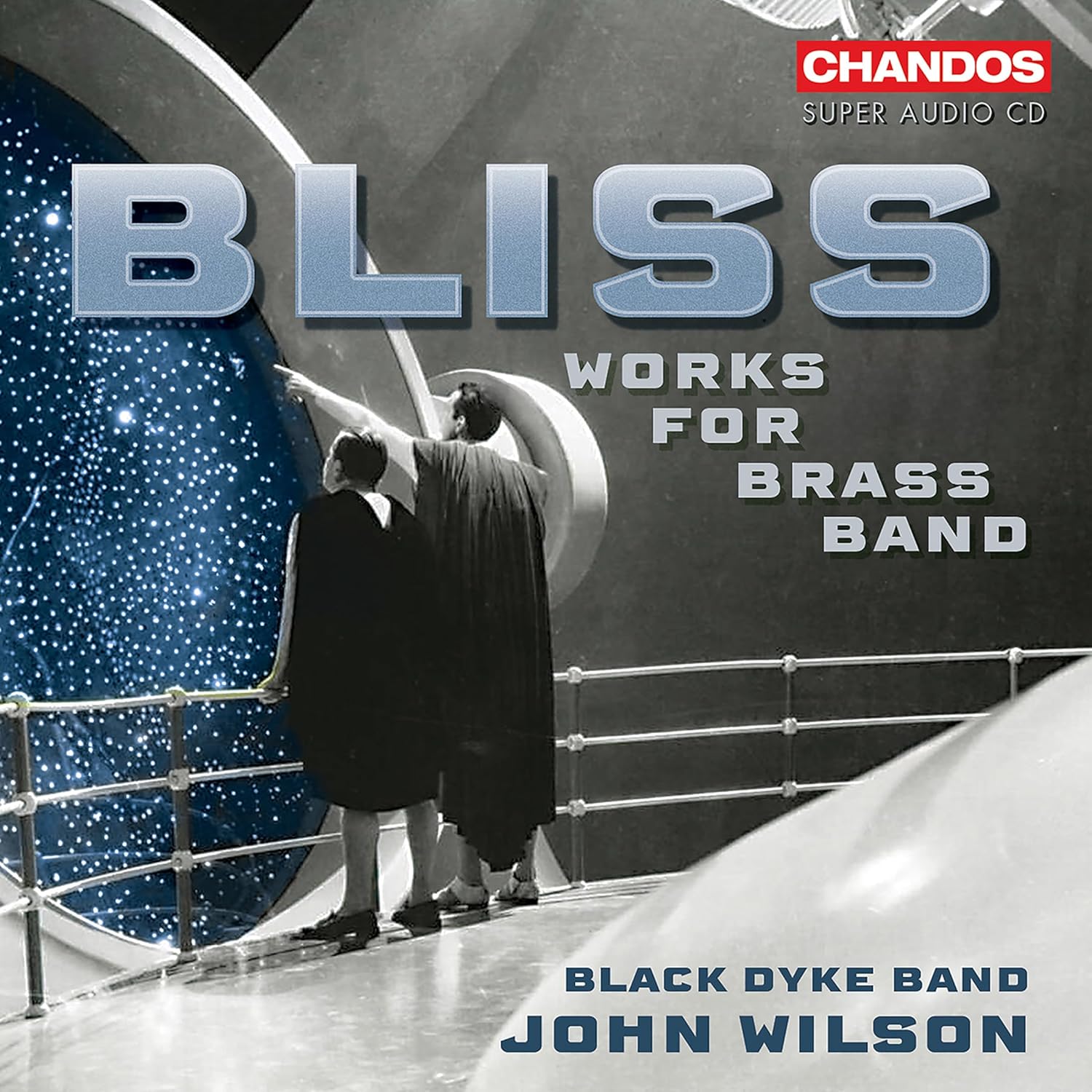 Arthur Bliss: Works for Brass Band Black Dyke Band,/John Wilson (Chandos)
Arthur Bliss: Works for Brass Band Black Dyke Band,/John Wilson (Chandos)
I’ve really got into the music of Arthur Bliss over the last couple of years, aided by Paul Spicer’s authoritative 1923 biography. I had always had Bliss in my head as a stuffy old establishment buffer, but he was far from that, although he did end up as Master of the Queen’s Music. As a young man – having fought with distinction in WWI – he was quite the radical, and an early composer for film, most notably in the groundbreaking Things To Come. Above all, what emerged from the biography, was a grounded, contented man, with a successful family life and career, far from the angst and difficulty that is so often the composer’s lot – someone who broadly left the world a better place than he found it.
This album of his music for brass band is performed by the legendary Black Dyke Band under conductor John Wilson, also rapidly ascending to legendary status. I have reviewed a number of his recordings in this column, and his attention to neglected corners of British repertoire is to be celebrated. The programme here mixes pieces written specially for brass from the start, with arrangements of those originally for orchestra, all of which work brilliantly in their new guises. Some reflect his official duties – such as the stirring Welcome the Queen that opens the disc, some his film work (a selection from Alexander Korda’s Things To Come) and his music for ballet, an important aspect of his output.
A discovery for me was Adam Zero, a 1946 ballet from which a 10-minute suite is extracted, arranged by Robert Childs especially for this album. It shows Bliss at his most restless, dramatic and varied and the playing of the Black Dyke Band is subtle and colourful, whether in festive mood or the introspection of the “Approach of Autumn”. Things To Come was a significant film (among other things, the first soundtrack featuring the LSO) although it was a difficult collaboration. But the music stands up where the film itself has dated. “Reconstruction” has a note of nobility that would be so helpful in Bliss’s later duties, and the final “March” creating an archetype for later film music. The band positively glistens.
The Belmont Variations was written in 1962 as a test piece for the National Brass Band Championships, is a darker-toned piece, and as is fitting has challenges for all sections of the band. The staccatos of variation 2 are nimble, the solo in variation 3 is bluesy and affecting, while variation 5 is just thrilling. After that there is music from a TV programme about the royal palaces of Britain and an arrangement by Eric Ball of four movements from the brilliant ballet Checkmate, combining Stravinsky with a peculiarly British musical sensibility and more than a hint of pre-WWII foreboding. It’s perhaps Bliss’s best piece, and given a scintillating reading. This album undoubtedly joins the long list of John Wilson successes, and will get plenty of re-listens from me. - Bernard Hughes
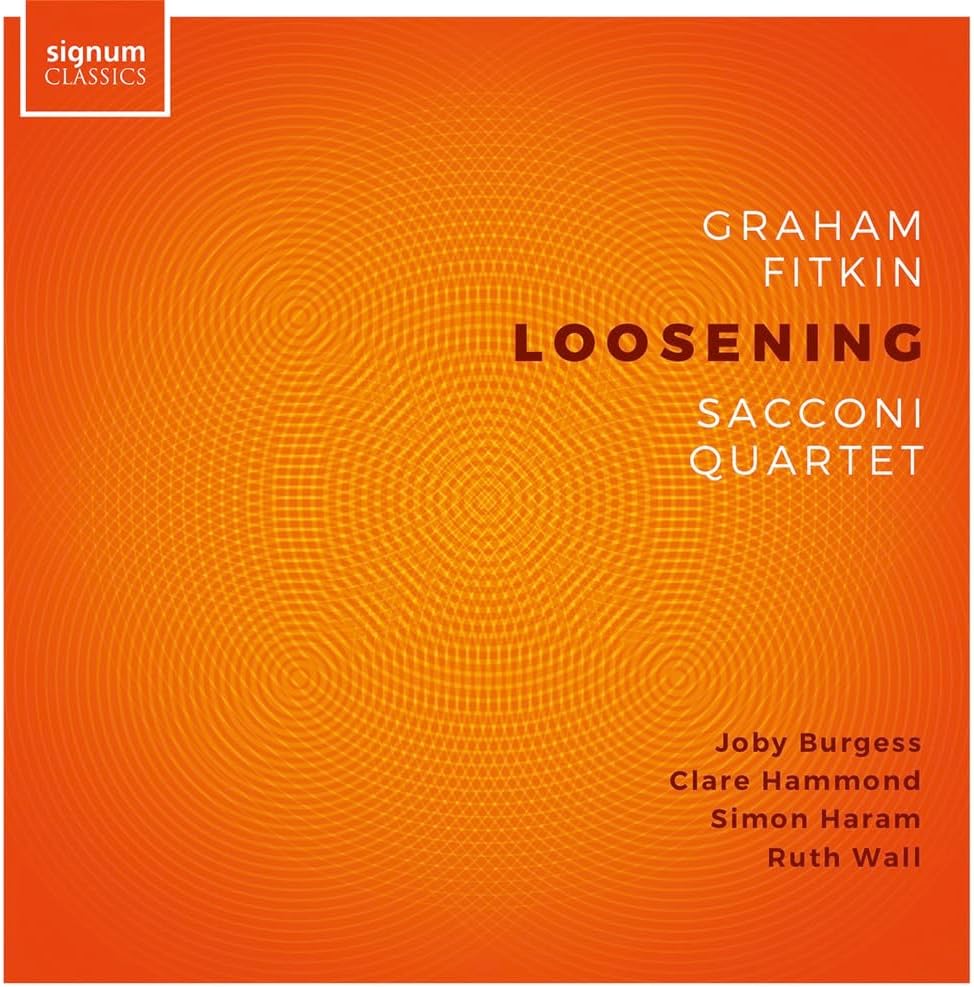 Graham Fitkin: Loosening Sacconi Quartet et al (Signum Classics)
Graham Fitkin: Loosening Sacconi Quartet et al (Signum Classics)
This double album of music by Graham Fitkin has just five pieces, all big-boned, each a premiere recording pitting the Sacconi Quartet against a soloist (or in one case, a pair of soloists). This brings out the contrast between the homogeneity of the string ensemble and the lone other voice. The pieces range from 15 minutes duration to nearly 28, in Fitkin’s non-developmental style that owes much to the minimalist and postminimalist lineage. The first piece, Loosening, is all about glissandos and sustained, ever-changing chords in the strings, above which Simon Haram’s soprano saxophone floats in long held notes and proto-melodies. There is something of Morton Feldman about it, although rest assured much more happens in much less time than in most Feldman, but there is something similar in the unemotional, unruffled surface. The second piece, Slow, features two organs, one played by Fitkin himself and the other by Ruth Wall. It juxtaposes three types of material in different combinations, the string music gradually infecting the organs’ iceberg-like chords.
Distil, with percussionist Joby Burgess, is the third mainly slow piece in a row. Fitkin writes that he wanted “to eschew the short sharp side of percussion and focus instead on the wonderful sustaining envelope that some of the instruments display”. This means using a string bow on vibraphone and glockenspiel, while the quartet are robbed of their sustaining power, playing pizzicato around the ghostly percussion notes. It progresses into dancing polyrhythms, the “ping” of the crotales liquid set against the dry string figuration. Touch is much faster, the flying fingers of pianist Clare Hammond recalling, texturally, Fitkin’s early work for multiple pianos. But harmonically the music is something of a departure for Fitkin, spiky and dissonant, reminding me of Berio or Ligeti. The final piece, Recur, starts with everyone plucking, quartet and Ruth Wall’s harp alike, before the texture develops into sustained notes in the strings and melody in the harp.
The Sacconi Quartet have had a long association with Graham Fitkin – including recording his complete quartets. And this album’s approach of “quartet plus” shows both their playing, and that of the soloists, to good effect. I’m not sure the pieces all earn quite such long durations, and in toto the sequence isn’t the most varied (which is why Touch is particularly welcome) – but if you already like Fitkin you’ll like this. If not, I would suggest starting with the recently re-issued 1990 album Flak. - Bernard Hughes
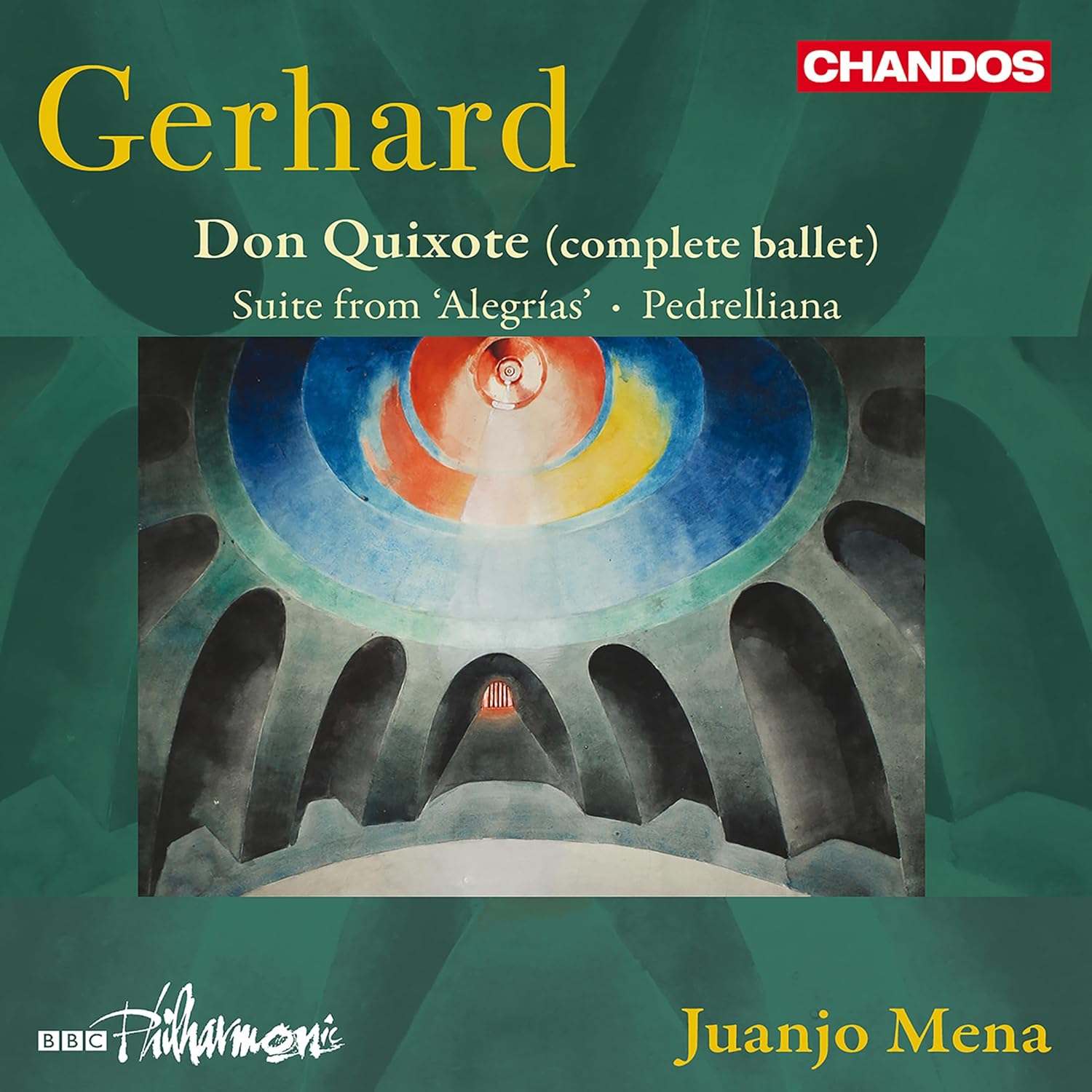 Gerhard: Don Quixote (complete ballet), Suite from Alegrías, Pedrelliana BBC Philharmonic/Juanjo Mena (Chandos)
Gerhard: Don Quixote (complete ballet), Suite from Alegrías, Pedrelliana BBC Philharmonic/Juanjo Mena (Chandos)
Listen to this superb new recording of Roberto Gerhard’s Don Quixote and several reasons for the music’s neglect spring to mind, namely the existence of the full length Minkus ballet and the elaborate forces required to perform Gerhard’s version (including a large percussion section and a pair of pianos). I’ve loved this work for decades, getting to know it through the old Víctor Pablo Pérez recording on the Valois label. Juanjo Mena’s BBC Philharmonic account has the edge over Pérez’s disc, with tighter orchestral playing and voluptuous Chandos sound. Gerhard (1896-1970) is a fascinating fringe figure, a Catalan-born Schoenberg pupil who, as a Republican, left Spain in 1939 and settled in Cambridge. Composed in the early 1940s and eventually premiered at Covent Garden, Don Quixote feels like a transitional work. Gerhard’s acute ear for colour ensures that nothing grates – if you’re fond, say, of Falla’s Nights in the Gardens of Spain or Ravel’s Alborada del Gracioso, you’ll love Don Quixote. Try the introduction’s jagged fanfare, a magical evocation of intense, oppressive heat, or the second scene’s pithy sequence of dances. Grotesquerie abounds, Gerhard making superb use of shrill piccolos and grunting bassoons. The closing minutes are unexpectedly moving, the titular hero falling asleep to a soft, glittering E major chord. You hear so much detail in Mena’s performance, with harp glissandi and string harmonics nicely audible.
The couplings are equally entertaining. A compact suite from Gerhard’s 1943 ballet Alegrías is a sequence of four flamenco dances, the finale containing an unexpected Chopin quote. And Pedrelliana is a tribute to Felipe Pedrell, an influential pedagogue whose pupils included Falla, Granados and Gerhard. Based on the last movement of an unperformed symphony composed in Pedrell’s honour, it’s a witty and propulsive showpiece. An unmissable disc – once you’ve consumed it, do investigate Chandos’s excellent cycle of Gerhard’s mature symphonies with the BBC SO and Mathias Bamert, still available as downloads.
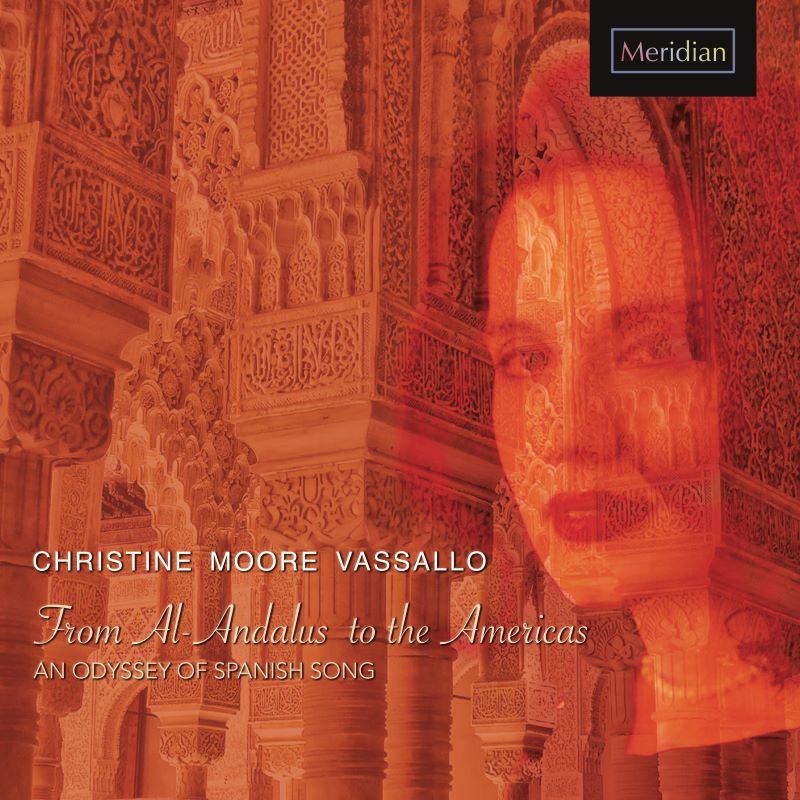 From Al-Andalus to the Americas – an Odyssey of Spanish Song Christine Moore Vassallo (soprano) (Meridian)
From Al-Andalus to the Americas – an Odyssey of Spanish Song Christine Moore Vassallo (soprano) (Meridian)
Here’s a bold attempt to condense 800 years of Spanish song into 77 minutes, American soprano Christine Moore Vassallo’s anthology containing 33 numbers accompanied variously by piano, guitar, flute, oud and darbuka. The prospect of some oud and darbuka action set me salivating, and it’s a pity that they’re only heard in the opening track, a 10th century mouwashshah from Andalucia (“Moorish” Spain) about an onlooker increasingly excited by the swaying hips of the woman he fancies. Vassallo’s sultry, unaffected delivery is an asset, reminding us that we’re listening to medieval popular music and not art song. This is one of those albums which combines education and entertainment in a handy package, so we move forward to a 16th century villancico telling of the capture of a Moorish village by ferocious invaders. Manuel Valls’ sequence of nine songs with texts by Sephardic Jews was published in 1975. Scored for voice, flute and guitar, they sound authentic though we’re not told whether Valls based his treatments on existing melodies.
Highlights include three exquisite numbers by Federico García Lorca – who knew that he spent time with Manuel de Falla travelling through rural Spain collecting and transcribing folk song? They’re wonderfully sung here, especially a catchy celebration of Seville’s attractions. We get Graciano Tarragó’s “Jaeneras que yo canto”. Made familiar in a recording by Victoria de los Angeles, Moore’s account stands comparison. Antón García Abril’s five Canciones del Jardin Segreto concludes with a rollicking depiction of Andalucia’s beauty and the disc concludes with a quirky set of Argentinian folk transcriptions by Alberto Ginastera. Vassallo nails every song, and hats off to pianist Jorge Robaina Pons and guitarist Pablo Gimenez Hecht for taking on the lion’s share of the accompaniments. Vassallo’s sleeve notes are a model of scholarly accessibility, and full texts and translations are provided.
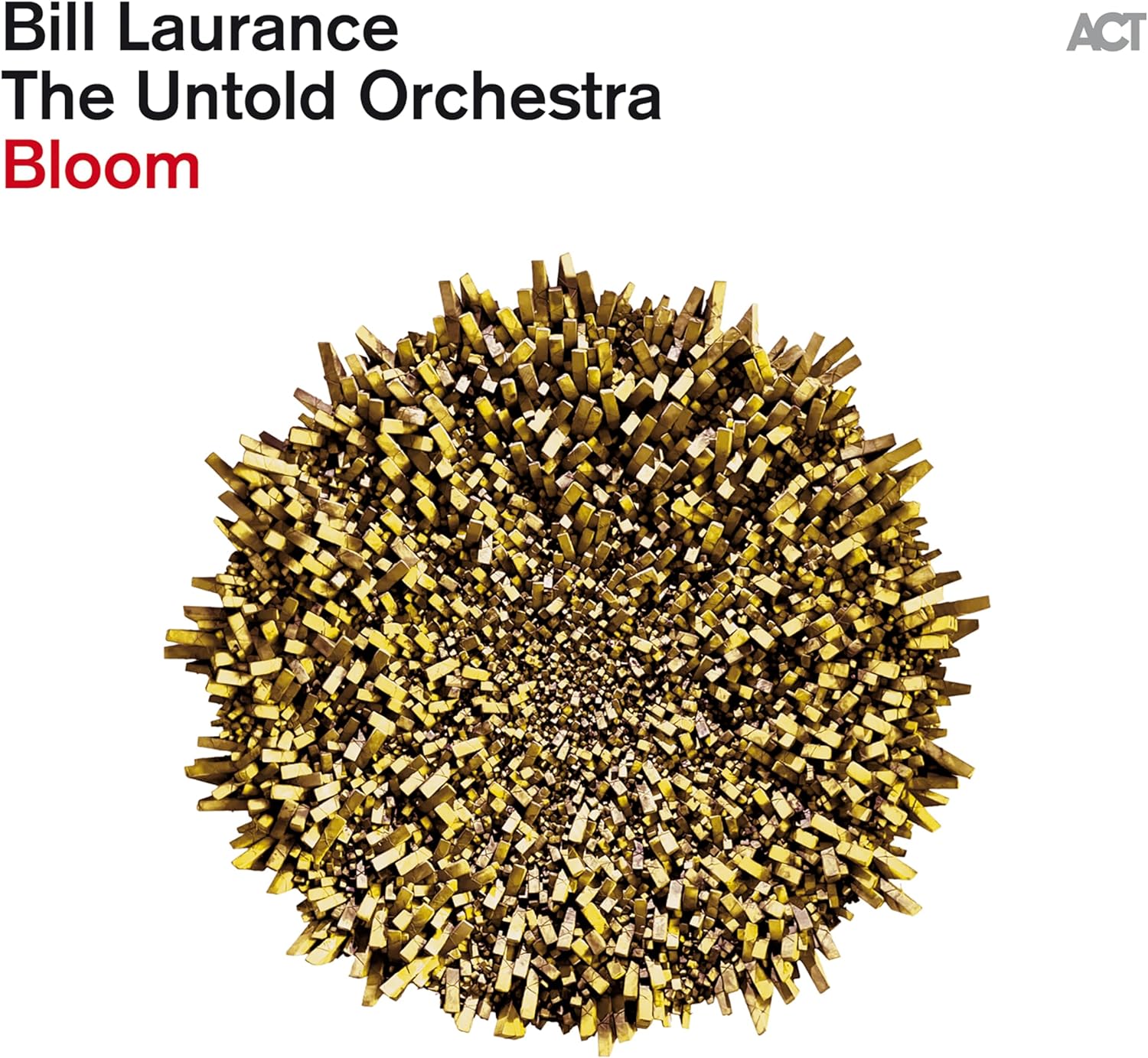 Bloom Bill Laurance and The Untold Orchestra (ACT)
Bloom Bill Laurance and The Untold Orchestra (ACT)
Pianist and composer Bill Laurance’s Bloom should share shelf space with Paul Mottram’s Seven Ages of Man (recently reviewed here), as another jazz-tinged multi-movement work for string orchestra with soloist. Mottram’s album loosely followed a birth-to-death narrative while Bloom is looser and more eclectic, a selection of nine discrete pieces. Laurance’s title track feels a little too well-behaved at first, the chugging strings and restrained piano writing ratcheting up the tension until Laurance suddenly breaks free 3’40” and finds his own voice, in exhilarating fashion. Something similar happens in “Right Where We Are”, the solo line floating above some hocketing viola and cello writing before Laurance amicably asserts his authority two minutes in.
Describing these tracks as cinematic isn’t a criticism, and Laurance never descends into easy note-spinning. Take the penultimate number “Above All”, where Laurance’s cocktail lounge stylings contain enough unexpected key changes to keep us awake, deftly accompanied by Rory Storm and Manchester’s Untold Orchestra. There’s much to enjoy here. Laurance’s string writing is assured, and he knows how to organise his ideas, each track arriving at a musical full stop instead of fading away. The emphatic closing cadence of the final piece “The Right Time” sounds as much like an invitation to listen to the album again as a farewell. An enjoyable collection, neatly played and beautifully engineered.

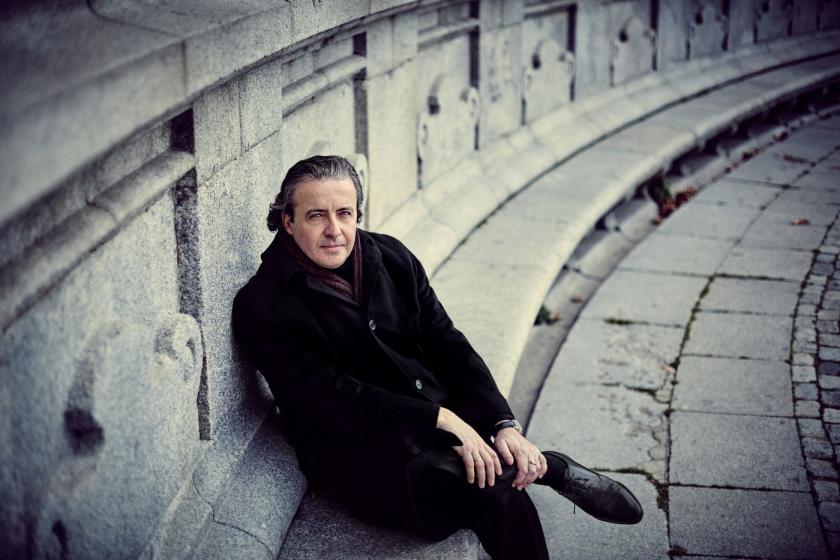












Add comment